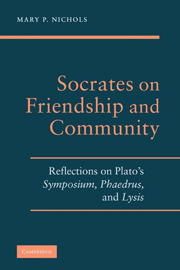Book contents
1 - The Problem of Socrates: Kierkegaard and Nietzsche
Published online by Cambridge University Press: 06 January 2010
Summary
Kierkegaard gave his dissertation, The Concept of Irony, the subtitle, With Continual Reference to Socrates. In a way, this subtitle might characterize Kierkegaard's thought as a whole. Stages on Life's Way, for example, includes an imitation of Plato's Symposium, in which Socrates encounters representatives of Athens' intellectual and political life, and presents what he has learned about love. Fear and Trembling presents Socrates as an intellectual tragic hero, in contrast to a knight of faith, while Philosophical Fragments explores faith as an alternative to the Socratic understanding of knowledge and truth. Kierkegaard's journals and papers have numerous and profound references to Socrates. Nietzsche as well used Socrates as a point of departure for his own work. His first book, The Birth of Tragedy, presents Socrates as the turning point of world history. And Twilight of the Idols, one of the last works that Nietzsche wrote, takes Socrates as an idol requiring a tuning fork to reveal his hollowness. He explains how Socrates “fascinated” the youth of Athens, but Nietzsche would be the first to admit that Socrates fascinated him as well, even if he regarded his own work “as a great declaration of war” against idols.
One does not take as one's primary interlocutor someone for whom one has no affinity. In this chapter, we shall explore the ways in which Kierkegaard and Nietzsche point to a much more complex Socrates than their more obvious criticisms of his self-denying universalism and otherworldly asceticism suggest.
- Type
- Chapter
- Information
- Socrates on Friendship and CommunityReflections on Plato's Symposium, Phaedrus,andLysis, pp. 7 - 24Publisher: Cambridge University PressPrint publication year: 2008



